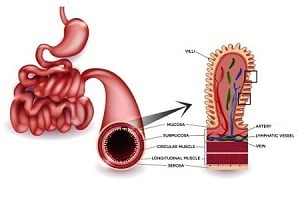Celiac Disease Complications
- Updated on: Jun 27, 2024
- 3 min Read
By
- Published on Sep 26, 2019


Celiac disease has a variety of symptoms and it is not easy to be diagnosed. If celiac disease is not diagnosed and treated on time, it may lead to many long-term complications.
Sometimes the disease is diagnosed because of these complications only when they resist treatment. Therefore, knowledge of these complications is extremely important.
Complications of Celiac Disease in Adults
Adults with celiac disease may suffer from various problems like:
Malnutrition
People with celiac disease find it very difficult to maintain a healthy weight. They may also feel weakness. This is because the body does not absorb essential nutrients, which in turn makes their body weak. Their body does not function properly and may not recover easily and quickly.
Malabsorption
Malabsorption is the condition in which the body does not absorb essential nutrients. This gives rise to deficiency of vitamins and minerals, which eventually leads to various other conditions not good for the body. Some of these conditions are:
- Anaemia: deficiency of iron
- Vitamin B12 deficiency
- Folate deficiency
- Vitamin D deficiency
Intolerance to lactose
Lactose intolerance is the inability to properly digest the sugar found in dairy products such as milk, cheese and butter. This type of digestion occurs in the small intestine too.
A continuous celiac disease gives rise to lactose intolerance. Lactose does not cause any damage to the body. It only triggers some gut related problems when lactose is consumed because they cannot be digested completely.
Celiac disease reduces the production of lactase enzyme (the enzyme responsible for digestion of sugar in milk). When a gluten-free diet is introduced, it heels the villi and lactase enzyme production is re-established.
Osteoporosis
Osteoporosis is a disease characterized by weakening of bone tissue and low bone density, which makes the bones brittle (more likely to break). This happens when the body lacks calcium.
The damaged villi are not able to absorb the amount of calcium required by the body. As symptoms of celiac disease reduce after introducing a gluten-free diet, osteoporosis gradually decreases.
Lymphoma
Lymphoma is a type of cancer involving the cells of the immune system, called lymphocytes. Celiac disease is an immune system condition and it also affects the cells of the immune system by causing cancer in those cells.
People who are diagnosed with the celiac diseases at a late stage are more likely to get lymphoma.
Nervous system disorders
People with celiac disease may develop certain nervous system disorders because of the following factors:
- Nutritional deficiencies resulting from lack of minerals and vitamins in the body
- Clustering of autoimmune conditions
- Protein targeted by celiac disease and those present in brain have a lot of similarities
The nervous system disorder may include:
- Neuropathy – It is a condition in which the peripheral nerves (responsible for communication between brain and rest of the body) get damaged. It causes weakness, numbness and pain in hands and feet.
- Ataxia – Ataxia refers to a group of disorders that affects muscle coordination, balance and speech.
Infertility
Women with celiac disease may find it difficult to get pregnant. If they do so, there are always chances of miscarriage. This is because during pregnancy a woman needs nutrients and minerals more than when she is not carrying. But with celiac, she is deprived of those essential nutrients, which makes her weak.
Dental defects
A dental defect such as a permanent damage to the enamel of the tooth is seen in people with celiac disease. This happens due to the deficiency of calcium.
Depression
Vitamin B6 and tryptophan are the important nutrients, which help to produce chemicals called neurotransmitters (chemicals that stimulate nerve cells in the brain).
People with celiac disease have the deficiency of these nutrients, which may cause depression, lack of energy, loss of concentration and other memory-related problems.
Complications of celiac disease in Children
Children with celiac disease may suffer from many problems like:
Irritability
Children with celiac disease are extremely irritable. They also remain in a cranky mood. They may feel uncomfortable and are unable to tell what they are going through. This may lead to irritability.
Low Birth Weight
Low birth weight is a term used to describe babies who are born less than 2.5 kg of weight. Deficiency of essential nutrients may cause low birth weight in babies.
Dental defects
Weak tooth enamel is mostly found in children with celiac disease. This happens because of deficiency of calcium.
Intussusception
It is a medical condition in which a part of the small intestine folds into its next section. It blocks the fluid and food and does not allow them to pass through. The symptoms may include jelly stool, abdominal pain and vomiting.
Delayed puberty
Due to lack of nutrients and minerals, young girls and boys may face the problem of delayed puberty. It means no signs of puberty by the age of 13 in girls and 14 in boys are noted.












